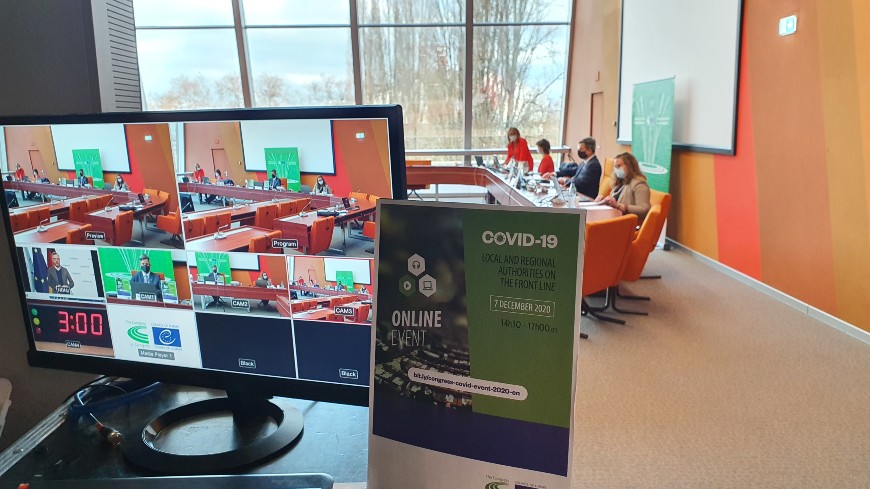On 7 December 2020, the Congress of Local and Regional Authorities of the Council of Europe organised an online event to examine difficulties encountered and best practices implemented in managing the Covid-19 crisis. The participants welcomed and assessed the role of the Athens Declaration adopted at the November 2020 session of the Council’s Committee of Ministers in protecting human rights, the rule of law and democracy in the context of exceptional measures. Better co-ordination between different levels of government, at European, national, regional and local level, could help striking the right balance between healthcare efficiency and democratic rights. Emphasis should be placed on local and regional authorities’ responsiveness and closeness to citizens.
According to Anders Knape, President of the Congress, the Covid-19 health crisis has sorely tested the different levels of government in Europe. The Council of Europe, through its binding legal instruments, together with its European Court of Human Rights and its institutions such as the Congress, has proven to be one of the main guarantors of human rights and democracy also in difficult circumstances.
Marija Pejčinović-Burić, Secretary General of the Council of Europe, pointed out that all the exceptional measures, both at national and at local level, must be strictly necessary, proportionate, non-discriminatory, temporary and constantly adapted in full conformity with the European Convention on Human Rights and member States’ other obligations. This is the very core of the Athens Declaration, which also supports the Congress in its efforts to ensure compliance with the European Charter of Local Self-Government. Local and regional authorities, which are the closest to citizens, must ensure the protection of freedom of expression and access to information, as well as respect for the fundamental, civil and social rights of the most vulnerable, especially the young and old, migrants, refugees, and women and children who suffer increased domestic violence during lockdowns. The Secretary General commended the tremendous amount of work done by members of the Congress in the last few months to exchange views on lessons learnt in times of crisis, in particular on the division of powers among the different levels of government.
Michael Roth, the German Minister for European Affairs, pointed out that, having been prepared by the Greek Chairmanship of the Committee of Ministers and supported by the German Chairmanship, “the Athens Declaration was discussed on the 70th anniversary of the European Convention on Human Rights.ˮ He also referred to the “toolkitˮ made available to European governments by the Secretary General of the Council of Europe to ensure that the exceptional measures taken during the current crisis remain proportionate to the threat posed by the spread of the virus. In his view, in order to deal with the competing demands of citizens, who want both consistent and uniform rules at national level and also measures adapted in real time to local situations, the different levels of public administration need to carry out consultations.
During the debate, the Congress members also proposed a set of initiatives to strengthen compliance with the European Charter of Local Self-Government in times of health crisis. Leendert Verbeek (Netherlands, SOC/G/PD), Chair of the Congress’s Monitoring Committee, welcomed the decision of the Bureau of the Congress to prepare a report on compliance with the Charter in member States with a view to its adoption at the Congress’s next session. Andrew Boff (United Kingdom), 1st Vice-Chair of the European Conservatives & Reformists Group (ECR), suggested that an assessment of the efficiency of health measures according to the degree of decentralisation in countries be drawn up. As pointed out by Robert Gruman (Romania, EPP/CCE), Chair of the Governance Committee of the Congress, States whose local and regional authorities enjoy a higher degree of autonomy have better managed the crisis through responsiveness adapted to the challenges on the ground. “Trust in local government is crucial during the current pandemicˮ, said Clemens Lammerskitten (Germany, EPP/CCE) on behalf of the German delegation to the Congress, and added that “local authorities which only carried out the orders of national governments have lost credibilityˮ.
In the view of most of the speakers, the current crisis threatens decentralisation, but is also a real opportunity to defend and strengthen it. According to Yoomi Renstrom (Sweden, SOC/G/PD), Chair of the Socialist Group of the Congress, this is also an opportunity which will enable local authorities to establish emergency mechanisms to safeguard the proper functioning of government and democratic rules during similar crises in the future. Marc Cools (Belgium), Chair of the Independent Liberal and Democratic Group (ILDG), drew attention to the huge efforts necessary to avoid a “lockdown of local and regional democracyˮ when half the administration is teleworking. He also called on local authorities not to use the crisis to surreptitiously take decisions whose content and implications have nothing to do with the pandemic, without a genuine public debate.
The challenges posed by the emergence of a genuine e-democracy and the rise of hate speech and discrimination on social media were also among the topics discussed. While expressing the support of the Congress’s youth delegates for the Athens Declaration, Evgenia Chamilou, the Cypriot youth delegate, highlighted the concerns of young people regarding the abuse of new technologies, in particular for contact tracing, in breach of individual rights.
In conclusion, Marija Pejčinović-Burić, Secretary General of the Council of Europe, said that multilevel governance, consultations between local and national authorities, and also between government and citizens, are the best safeguards for human rights, as well as for the civil and social rights protected by the Organisation. She welcomed the impressive work done by the Congress in this area and the ability to innovate in the field of e-democracy, while pointing out that the crisis has nonetheless shown the limits of new technologies in ensuring democratic governance.
*** "COVID-19: Local and regional authorities on the front line" event - 7 December 2020 ***
Dossier - Agenda - Photo - Video




